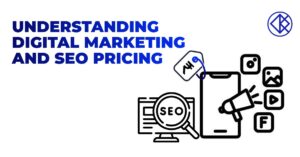Introduction:
In the vast and ever-evolving landscape of digital marketing, one strategy has risen to the forefront as a true game-changer: content marketing. Far beyond a mere buzzword, content marketing is a powerful approach that not only informs and entertains but also builds meaningful connections with your audience. In this blog, we’ll embark on a journey through the art and science of content marketing, exploring its core principles, best practices, and the transformative impact it can have on your brand’s digital presence.
- Understanding Content Marketing:a. Beyond Advertising: Content marketing goes beyond traditional advertising. It’s about creating and distributing valuable, relevant, and consistent content to attract and engage a clearly defined audience.b. Building Trust: Trust is the currency of the digital age. By providing valuable content, you establish your brand as an authority in your industry, fostering trust and loyalty among your audience.
- Know Your Audience:a. Buyer Personas: Develop detailed buyer personas to understand the demographics, preferences, and pain points of your target audience. Tailoring your content to these personas enhances its relevance and impact.b. User Journey Mapping: Map out the customer journey to create content that aligns with each stage—awareness, consideration, decision, and post-purchase. This ensures a cohesive and effective content strategy.
- Content Creation:a. Quality Over Quantity: Focus on creating high-quality content that resonates with your audience. Whether it’s blog posts, videos, infographics, or podcasts, prioritize substance and relevance.b. Storytelling: Humans are wired to connect with stories. Incorporate storytelling into your content to make it more relatable and memorable. Share success stories, customer testimonials, or the journey of your brand.c. Diverse Formats: Experiment with various content formats to cater to different audience preferences. This includes written articles, videos, podcasts, webinars, and interactive content.
- Search Engine Optimization (SEO):a. Keyword Strategy: Conduct keyword research to understand the terms your audience is searching for. Integrate these keywords naturally into your content to improve search engine visibility.b. User-Friendly Content: Create content that is easy to read and navigate. Use descriptive headings, bullet points, and multimedia elements to enhance user experience.
- Content Distribution:a. Social Media: Leverage social media platforms to share and promote your content. Tailor your approach to each platform, considering the demographics and preferences of your audience.b. Email Marketing: Build an email subscriber list to distribute your content directly to interested audiences. Use personalized and engaging email campaigns to drive traffic.c. Collaborations: Partner with influencers, other brands, or industry experts to expand your content’s reach. Cross-promotions and collaborations can introduce your brand to new audiences.
- Measuring Success:a. Key Performance Indicators (KPIs): Identify and track relevant KPIs such as website traffic, engagement metrics, conversion rates, and social shares. These metrics provide insights into the effectiveness of your content strategy.b. Analytics Tools: Utilize analytics tools like Google Analytics, social media insights, and email marketing analytics to gain a comprehensive view of your content’s performance.
- Adapting to Trends:a. Video Dominance: With the rise of video content, consider incorporating videos into your strategy. Whether it’s tutorials, product demonstrations, or behind-the-scenes footage, video content is highly engaging.b. Interactive Content: Embrace interactive content such as quizzes, polls, and surveys to enhance user engagement and gather valuable insights.
Conclusion:
Content marketing is a dynamic and ever-evolving discipline that has the power to transform how businesses connect with their audience. By understanding your audience, creating compelling content, optimizing for search engines, and adapting to emerging trends, you can position your brand as a trusted authority in the digital realm. As you embark on your content marketing journey, remember that it’s not just about selling a product; it’s about telling a story that resonates with your audience and leaves a lasting impression.





